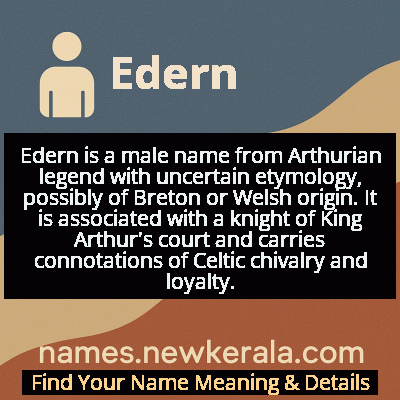Edern Name Meaning & Details
Origin, Popularity, Numerology Analysis & Name Meaning of Edern
Discover the origin, meaning, and cultural significance of the name EDERN. Delve into its historical roots and explore the lasting impact it has had on communities and traditions.
Name
Edern
Gender
Male
Origin
Arthurian
Lucky Number
1
Meaning of the Name - Edern
Edern is a male name from Arthurian legend with uncertain etymology, possibly of Breton or Welsh origin. It is associated with a knight of King Arthur's court and carries connotations of Celtic chivalry and loyalty.
Edern - Complete Numerology Analysis
Your Numerology Number
Based on Pythagorean Numerology System
Ruling Planet
Sun
Positive Nature
Leaders, ambitious, highly driven, self-reliant, innovative.
Negative Traits
Overly aggressive, domineering, impatient, selfish.
Lucky Colours
Red, orange, gold.
Lucky Days
Sunday.
Lucky Stones
Ruby, garnet.
Harmony Numbers
2, 3, 9.
Best Suited Professions
Entrepreneurs, managers, engineers.
What People Like About You
Courage, determination, leadership.
Famous People Named Edern
Edern ap Nudd
Arthurian Knight
Knight of King Arthur's Round Table featured in Welsh Arthurian tales
Saint Edern
Christian Saint
6th-century Breton saint who founded churches in Brittany
Edern of Lannédern
Religious Founder
Established the religious settlement that became Lannédern commune
Name Variations & International Equivalents
Click on blue names to explore their detailed meanings. Gray names with will be available soon.
Cultural & Historical Significance
The name's significance extends beyond literature into religious and geographical contexts. As Saint Edern, the figure becomes part of the group of Celtic saints who traveled between Wales, Cornwall, and Brittany during the 5th and 6th centuries, establishing religious communities that became centers of local identity. The survival of place names like Lannédern ('hermitage of Edern') in Brittany demonstrates how these saintly figures became permanently woven into the landscape and collective memory of Celtic regions. This dual identity—as both literary hero and historical religious figure—makes Edern a powerful symbol of Celtic cultural continuity and adaptation.
Extended Personality Analysis
The personality associated with Edern reflects the name's dual heritage as both Arthurian knight and Celtic saint. Individuals with this name are often perceived as possessing a quiet, steadfast character with deep reserves of inner strength. They tend to be loyal almost to a fault, embodying the Celtic virtue of faithfulness to one's lord or community. This creates a personality that values duty and honor above personal ambition, preferring to work behind the scenes rather than seek glory. Their strength lies in their reliability and their ability to endure challenges without complaint.
Drawing from the saintly associations, those named Edern often exhibit a spiritual depth and connection to nature that sets them apart. Like Saint Edern who chose a stag as his mount, they may display unconventional approaches to life and a special affinity for the natural world. This combination creates a personality that is both grounded and mystical, practical yet attuned to deeper meanings. They often serve as bridges between tradition and innovation, respecting ancient ways while finding new paths forward. Their quiet confidence and connection to their roots make them natural preservers of culture and tradition.
Modern Usage & Popularity
In contemporary naming practices, Edern remains exceptionally rare outside of its native Breton context, where it experiences occasional use as part of cultural revival efforts. The name has not gained significant traction in English-speaking countries, remaining primarily within circles interested in Arthurian literature, Celtic studies, or Breton nationalism. Its usage patterns reflect a deliberate choice to honor Celtic heritage rather than follow mainstream naming trends. In Brittany itself, the name maintains a modest but steady presence, particularly in Finistère where local saints remain culturally relevant. The digital age has seen a slight increase in visibility through online communities dedicated to Celtic culture and Arthurian studies, though it remains well outside the top 1000 names in any major country.
Symbolic & Spiritual Meanings
Symbolically, Edern represents the synthesis of Celtic warrior ideals with Christian spirituality that characterized the transition from late antiquity to the early medieval period in Celtic regions. The name embodies the concept of faithful service—whether to a earthly lord as in Arthurian contexts or to divine calling in hagiographical traditions. The unusual detail of Saint Edern riding a stag rather than a horse adds rich symbolic layers, connecting the name to themes of wild wisdom, unconventional holiness, and harmony with nature. This association positions Edern as a mediator between human civilization and the natural world, between tradition and innovation. In broader cultural terms, the name symbolizes the resilience of local identities and the enduring power of regional traditions in the face of cultural homogenization.

